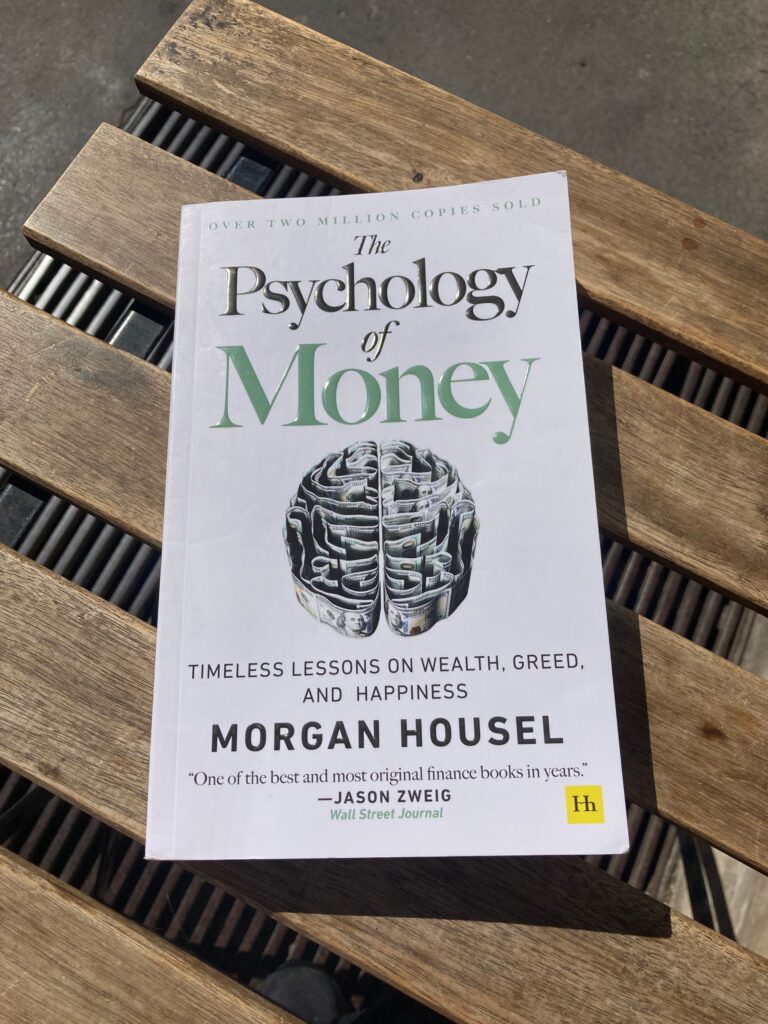In the world of personal finance and investing, understanding the numbers is only part of the equation. Even seasoned investors often struggle not with how to earn money, but with how to think about it. That’s where Morgan Housel’s The Psychology of Money: Timeless Lessons on Wealth, Greed, and Happiness comes in. This book has become a cornerstone for anyone seeking to improve financial decision-making, build wealth, and gain long-term financial freedom.
Whether you’re a beginner taking your first steps in investing or an intermediate-level investor looking to refine your strategies, this book offers actionable insights that go beyond spreadsheets and stock charts.

Understanding Money is More Than Numbers
One of the most important lessons from The Psychology of Money is that financial success is not solely determined by knowledge or intelligence. Housel emphasizes that behavior, mindset, and emotions play a critical role in how we earn, save, invest, and spend.
From fear and greed to patience and long-term thinking, Housel explores the psychological patterns that shape financial outcomes. By mastering these behaviors, readers can avoid common mistakes, minimize losses, and achieve sustainable wealth growth.
Key Lessons from The Psychology of Money
1. Wealth is What You Don’t See
Housel reminds readers that true wealth isn’t about flashy cars, luxury vacations, or large houses. Wealth is often invisible—it’s the money saved, invested, and compounded over time. Many people confuse spending with success, but real financial security comes from restraint and smart money management.
2. Compounding is Powerful
One of the simplest yet most overlooked concepts in finance is compounding. Housel illustrates how even modest investments grow significantly over time when left to compound. This principle applies not only to money but also to knowledge and personal growth—small, consistent actions produce extraordinary results.
3. Avoid Comparing Yourself to Others
Financial decisions should be personal and aligned with your goals. Housel warns against comparing yourself to others or trying to keep up with societal expectations. Wealth-building is a personal journey, and emotional well-being plays a critical role in long-term success.
4. Prepare for the Unexpected
Financial markets are unpredictable, and life often throws unexpected challenges. Housel emphasizes the importance of saving, diversification, and cautious optimism. By preparing for uncertainty, investors can protect themselves from catastrophic losses and take advantage of opportunities when they arise.
5. Patience Beats Timing
Timing the market is nearly impossible, even for professionals. Housel shows that patience, consistency, and disciplined investing outweigh the risks of trying to predict short-term market movements. Long-term thinking is the cornerstone of financial independence.
Applying These Lessons to Your Life
Implementing Housel’s insights doesn’t require complex strategies. Some practical steps include:
- Start Saving and Investing Early: Even small amounts can grow substantially over time thanks to compounding.
- Focus on Behavior: Avoid impulsive spending and maintain disciplined investing habits.
- Think Long-Term: Make decisions with your financial future in mind, not short-term gains.
- Diversify Income and Investments: Protect yourself against market volatility and unexpected expenses.
- Educate Yourself Continuously: Learning about money and investing is a lifelong process.
By incorporating these behaviors, anyone can improve their financial decisions and achieve meaningful wealth growth over time.
Why This Book is Perfect for Amazon Shoppers
If you’re looking to invest in your financial education, The Psychology of Money is available on Amazon in multiple languages and formats, making it accessible to readers across the globe. Whether you prefer reading a physical book or listening to the audiobook during your commute, there’s an option for everyone.
Amazon Links for Different Regions:
Brazil
USA
Spain & Portugal
Purchasing through these affiliate links helps support content creators like this blog while giving you access to one of the most insightful books on personal finance ever written.
How The Psychology of Money Can Transform Your Financial Thinking
Housel’s book is more than just a guide—it’s a mindset shift. Readers learn to:
- Avoid impulsive financial decisions driven by fear or envy.
- Understand the emotional dynamics behind investing, saving, and spending.
- Build wealth patiently through consistent actions rather than chasing quick gains.
- Develop confidence in personal financial decisions without comparison to others.
- Prepare for uncertainty and adapt to changing circumstances with resilience.
By mastering these lessons, anyone can gain control over their finances and create a foundation for lasting wealth.
Conclusion: Invest in Your Financial Education Today
The Psychology of Money by Morgan Housel is a must-read for anyone seeking to understand money on a deeper level. Its lessons are timeless, practical, and applicable to readers at all stages of their financial journey.
Whether you are starting your first investment, aiming to grow your wealth, or looking to develop a healthier relationship with money, this book offers the insights and strategies needed for success.
Don’t just read about wealth—learn how to think about it, behave strategically, and build it over time. Start your journey today by getting your copy through Amazon and transform the way you see money forever.

Leave a Reply